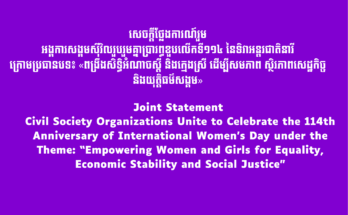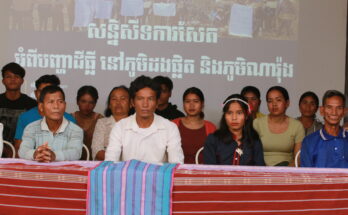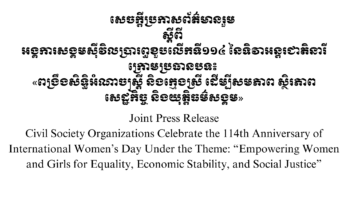On 16 November 2011, Mr. Loch Loa, investigating judge at Rattanakiri Provincial Court, pronounced the termination of the judicial investigation of Mr. Pen Bunna and Mr. Chhay Thy, provincial staff of Cambodian Human Rights and Development Association (ADHOC). The judge’s official letter, closing the investigation stage and transferring the case to the to the prosecutor, outlined the following main points:
1. Eleven community representatives of the people affected by the land conflict surrounding Sa Yors village, Ba Tang commune, Lum Pat district, Rattanakiri province, (Mr. Yang Torn, Mr. Svin Vev, Mr. Tol Eu, Mr. Svin Tu, Mr. Pring Vin, Mr. Hasay Kam Na, Mr. Meas Si Lut, Mr. Pech Pun Lok, Mr. Ouch Neach, Mr. Leng Mo and Mr. Sev Kri) will remain under supervision as suspects in the crime of violating property owners’ rights, as stipulated under Articles 247 and 253 of the Land Law (2001).
The letter suggests that the investigating judge strongly suspects these eleven people of having committed a crime against the property owners, i.e. the private company D.M. Group, and that he considers the conflicted land as property of this company. On 22 of November 2008, a bridge built by D.M. Group on the development site was burned down and newly planted rubber trees were destroyed. However, the investigating judge has no witnesses or other evidence to suggest that the damage to the company’s property was carried out by these eleven villagers. The other pressing issue is that the investigating judge’s comments demonstrate his belief that the disputed land is the property of company, even though the land conflict has yet to be resolved and an official decision has yet to be made on the lawful ownership of the land in question.
2. Mr. Pen Bunna, Provincial Coordinator of ADHOC’s Rattanakiri office, Mr. Chhay Thy, Provincial Human Rights Monitor, and Mr. Ratha Visal, Radio Free Asia (RFA) journalist based in Rattanakiri, remain charged with the crime of incitement under Article 52 and 59 of UNTAC. The upholding of these charges and the transfer of the case to the office of the prosecutor comes as a major blow to these human rights defenders who have consistently professed their innocence. The letter suggests that the investigating judge continues to suspect the two ADHOC staff members and the RFA journalist of having committed the crime of incitement, despite the stark lack of evidence to support this charge. The charge is upheld in spite of statements by the men describing their dealings with the villagers and clearly counteracting accusations of incitement, in addition to thumbprints obtained from the villagers guaranteeing the men’s innocence. Based on the facts, ADHOC believes that, instead of indicting the three men, the investigating judge should issue a non-suit order in accordance with Article 247, paragraph 3, point 3, of the Criminal Procedure Code[1], thereby dropping all charges.
[1] Criminal Procedure Code 2007, Article 247 Closing Order: “The investigating judge shall issue a non-suit order in the following circumstances:
1.The facts do not constitute a felony, misdemeanor or petty offense;
2. The perpetrators of the committed acts remain unidentified.
3.There is insufficient evidence for a conviction of the charged person.”



